This article was co-authored by David Nazarian, MD. Dr. David Nazarian is a board certified Internal Medicine Physician and the Owner of My Concierge MD, a medical practice in Beverly Hills California, specializing in concierge medicine, executive health and integrative medicine. Dr. Nazarian specializes in comprehensive physical examinations, IV Vitamin therapies, hormone replacement therapy, weight loss, platelet rich plasma therapies. He has over 16 years of medical training and facilitation and is a Diplomate of the American Board of Internal Medicine. He completed his B.S. in Psychology and Biology from the University of California, Los Angeles, his M.D. from the Sackler School of Medicine, and a residency at Huntington Memorial Hospital, an affiliate of the University of Southern California.
There are 11 references cited in this article, which can be found at the bottom of the page.
This article has been viewed 72,776 times.
Being sick can be stressful. Congestion, headaches, and worrying about what you're missing can make it difficult to relax when you are trying to recover from a cold or the flu. Improving your sleep, clearing your mind, and choosing relaxing activities are essential for the road to recovery.
Steps
Sleeping Better While Sick
-
1Speak to a health professional before taking any medication. Whether you’re taking prescription medication or wanting to combine over-the-counter cold and flu remedies, consult a pharmacist or health professional to avoid any negative reactions.[1]
- For example, if you’re taking antidepressants, sleeping pills, or anti-anxiety drugs, avoid over-the-counter medications containing antihistamines that make you sleepy. The combination can have harmful side effects and can also be lethal in some cases.
-
2Be careful with over-the-counter remedies. Not all over-the-counter medications will help you sleep better. Also, many sleep medications and pain killers help you fall asleep but reduce the quality of your sleep. Avoid cold and flu medications that contain pseudoephedrine or ephedrine.
- If you have to take these medications, take them 2 or 3 hours before you plan on going to sleep.
- Take these decongestants when you know you will be awake and medicines that have drowsiness-causing painkillers or antihistamines when you want to sleep.
Advertisement -
3Be careful when choosing nasal sprays. While nasal sprays can decongest your nose for 8 hours or more, they may also contain stimulants that make it difficult for you to sleep.
- Look for nasal sprays with oxymetazoline or xylometazoline to best open the breathing passage in your nose. Oxymetazoline and xylometazoline are not stimulants so they won't keep you up at night.
- Nose strips mechanically open up the nasal passages, so thus they have no stimulating effect as well.
-
4Have a hot soothing drink. While your appetite may decrease, ensure you don’t get dehydrated by drinking plenty of fluids. High-calorie drinks, like hot chocolate or Ovaltine, can signal our bodies to go into sleep mode.
- Research has shown that a hot cordial can aid in many cold and flu symptoms like sneezing and coughing.
-
5Arrange your bedroom to help you sleep better. Get rid of distractions like a tv, computer, or other electronic devices. Also, regulate a comfortable temperature as keeping your room cool will aid with sleeping.[2]
- Dry-humidifiers and vaporizers may help with your breathing while keeping the atmosphere of your room conducive to sleeping.
Calming Your Mind While Sick
-
1Learn the basics of meditation. Meditation is being aware. Listen to your breathing and try to clear your mind of other thoughts. Many find it helpful to repeat a mantra to help focus.[3]
- There are many variations of meditation, choose one that best suits you.
-
2Breathe deeply and with purpose. Breathing slowly and from deep within your diaphragm will immediately relax you. This may be difficult when your nose is clogged so try breathing from your mouth.[4]
- Place your hand on your stomach and feel it push out as you inhale deeply. As you breathe all the air out, bring your stomach back to its original position. This is not a forceful motion, but rather just to ensure that you're indeed taking a deep breath from your diaphragm.
-
3Be mindful of the moment. Whether you are looking at your pet or examining your hand, focus on the present to reduce stress. Breathe slowly and focus on the moment by describing it to yourself in detail.[5]
-
4Visualize a peaceful scene. Relax by recalling a serene location or happy memory. Whether you transport yourself to a beach or time an old college road trip, focus on details to calm your mood.[6]
-
5Listen to music. Music can greatly influence your mood so choose something with a soothing melody or a song that you associate with a happy memory.[7]
- Be careful not to irritate an already sore throat by singing along too loudly.
Getting Cozy
-
1Put your favorite pajamas on. Get comfortable and get into soft fabrics. Whether you prefer a cotton tee or a fluffy robe, soft materials will help you relax. Also, choose fabrics that will keep you warm but won't let you overheat.
- Fleece is great to keep you insulated while whisking away moisture.[8]
-
2Stay warm. Cuddle up under your favorite blanket for that extra layer of warmth and comfort. Shivering weakens the immune system and our extremities are the first to feel the cold. Cover up your hands and feet under your comfiest blanket.[9]
- You can also use fluffy socks, gloves, and a hat but this may seem excessive when indoors.
-
3Pile up your pillows. Pillows are a great way to relax because they are soft and comforting. Use as many as you need to make you feel comfortable and relaxed. Choosing the right pillow can help you get better sleep and recover from your cold faster.
- Pillows can be chosen based on material and the position in which you sleep.
- Pillows can also help to elevate your head and reduce nasal congestion as well.
Picking Your Own Way to Relax
-
1Avoid alcohol. One drink may be okay but several can block the breathing passages in your nose especially at night. Read the labels of any medication you are taking as it generally is not recommended to combine medications with alcohol.
-
2Choose an activity where you can sit up or elevate your head. If you lay flat, the post nasal drip will be pulled by gravity down from your nose into your throat, making it difficult to breathe.[10]
- For example, read a book, have a movie marathon, or play with your pet.
-
3Utilize steam. Whether you take a hot bath, use a humidifier, or place your face over a bowl of hot water with a towel over your head, moisture in the air loosens congestion.[11]
- Be careful not to burn yourself if placing your head over a bowl of hot water.
-
4Drink tea and water throughout the day. Avoid dehydration by drinking a lot of water. You lose a lot of fluids when you’re sick and have a runny nose and are congested. Replenish yourself with fluids that naturally have a calming effect. Choose a tea-like chamomile to help you relax.[12]
- Adding some honey to your tea as it helps to soothe your throat.
- Many types of herbal tea can help with congestion, for instance, licorice root tea is an expectorant.
-
5Choose activities you enjoy. Make time for yourself and relax as only you know how. Don’t let others add to your stress by volunteering unwanted help. Take the time you need to heal on your own.
- Make sure that you check in with any clients, teachers, or anyone else that will be affected by your absence. You won’t be able to relax if you’re receiving concerned emails or angry phone calls. Understand that everyone gets sick and that you’re allowed to take some time to recover.
Asking for Help
-
1Acknowledge that you are too sick to perform your normal functions. We all have different thresholds for functioning while sick. You are allowed to let yourself feel bad and rely on your support system. If you have children or other important responsibilities that can't be missed, delegate them to people you trust.[13]
-
2Call a friend or family member. Being sick can make you lonely and temporarily stop your social life. While it’s good to take time for yourself, realize when you need support and who best can fulfill this need.[14]
- Specifically, calling your mom can bring you the feeling of ease that only she can bring. Remember when she used to bring you chicken soup when you were young?
-
3Give detailed instructions. Whether you're asking someone to help with your kids or a co-worker to take over a presentation, be as detailed as possible. Write down all pertinent information and ask them to repeat it so you know that they've understood.
- Utilize a checklist to help keep track of every detail needed to be done.
Warnings
- Be careful not to overexert yourself.⧼thumbs_response⧽
- If you are already taking antihistamines for other conditions, refrain from taking more from over-the-counter cold and flu remedies because you can overdose.⧼thumbs_response⧽
- Avoid over-the-counter painkillers that contain caffeine as it is a stimulant and will keep you awake.⧼thumbs_response⧽
- If you are overly sensitive to alcohol, watch for medications that contain small doses.⧼thumbs_response⧽
References
- ↑ David Nazarian, MD. Diplomate, American Board of Internal Medicine. Expert Interview. 26 March 2020.
- ↑ David Nazarian, MD. Diplomate, American Board of Internal Medicine. Expert Interview. 26 March 2020.
- ↑ https://healthy.kaiserpermanente.org/washington/health-wellness/podcasts/emotional-wellness/relaxation
- ↑ https://www.helpguide.org/articles/stress/relaxation-techniques-for-stress-relief.htm
- ↑ https://greatergood.berkeley.edu/topic/mindfulness/definition
- ↑ https://www.betterhelp.com/advice/stress/9-visualization-techniques-for-stress-reduction/
- ↑ https://www.unr.edu/counseling/virtual-relaxation-room/releasing-stress-through-the-power-of-music
- ↑ http://www.womansday.com/health-fitness/womens-health/a4419/your-winter-health-survival-guide-100227/
- ↑ http://www.health.harvard.edu/staying-healthy/out-in-the-cold
- ↑ http://www.huffingtonpost.com/2013/01/17/sleep-better-while-sick-cold-flu_n_2487635.html
- ↑ http://www.huffingtonpost.com/2013/01/17/sleep-better-while-sick-cold-flu_n_2487635.html
- ↑ David Nazarian, MD. Diplomate, American Board of Internal Medicine. Expert Interview. 26 March 2020.
- ↑ https://psychcentral.com/blog/13-healthy-ways-to-comfort-yourself
- ↑ http://www.mayoclinic.org/healthy-lifestyle/stress-management/in-depth/social-support/art-20044445
About This Article
To relax when you’re sick, put on some comfy pajamas, cuddle up with your favorite blanket, and listen to soothing music. Taking a hot bath and drinking some chamomile tea can also help you relax. You may feel tempted, but try to stay away from distractions like your TV or computer. When it comes to your medication, you should be careful with ones that may hinder your sleep, so check with a health professional before taking anything. For additional advice, including how to ask for help when you’re feeling sick, read more!


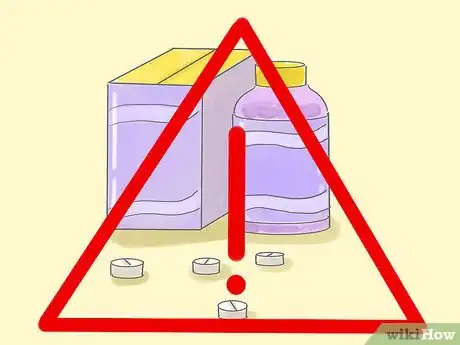
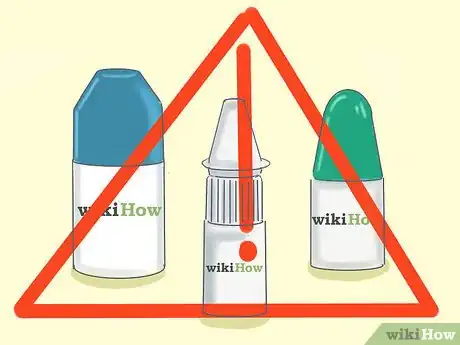

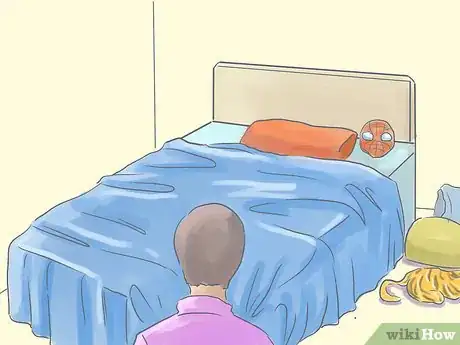
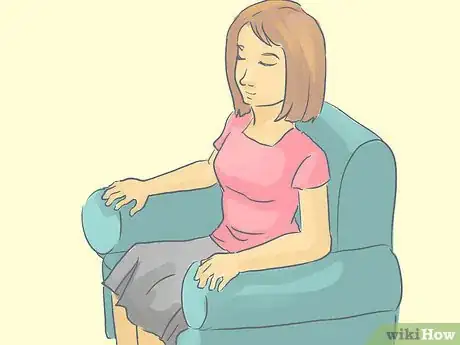






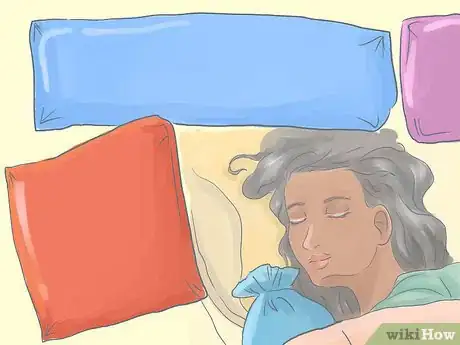
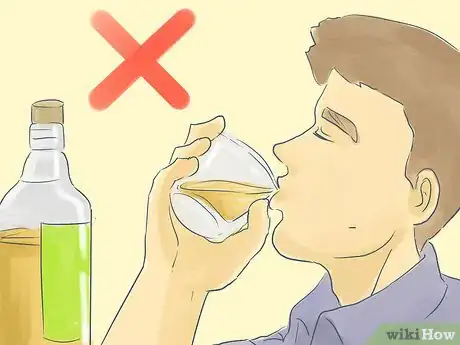



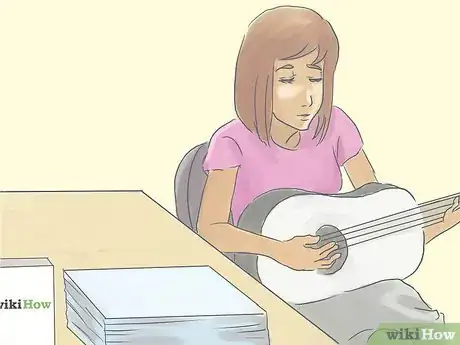
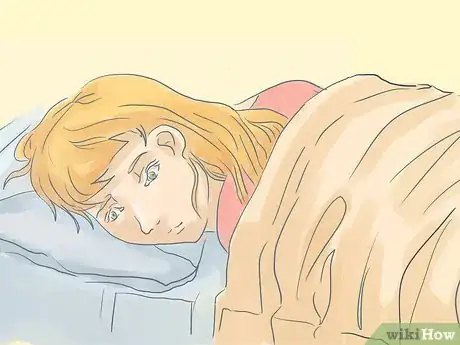
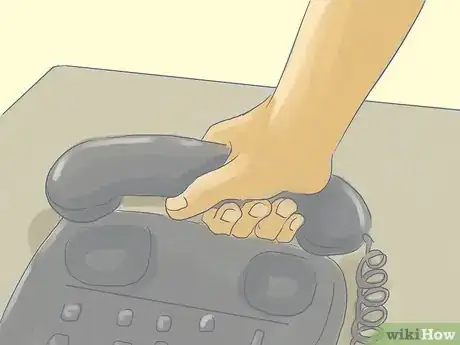







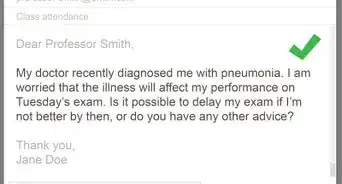
-Step-14-Version-2.webp)























































Medical Disclaimer
The content of this article is not intended to be a substitute for professional medical advice, examination, diagnosis, or treatment. You should always contact your doctor or other qualified healthcare professional before starting, changing, or stopping any kind of health treatment.
Read More...